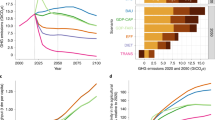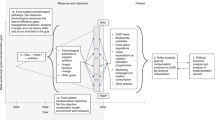Abstract
Food systems require urgent transformation towards social and ecological sustainability. Degrowth posits a radical pathway of transformation to reduce ecological impacts while increasing well-being and reducing inequality. Here we highlight that degrowth and food systems—albeit both linked to transformation—are not well integrated. We conduct a conceptual exploration of the potential alignment between key food systems and degrowth transformation measures, arguing for complementary and reciprocal perspectives to theorize and enact transformation. Finally, we offer concrete practical actions to integrate degrowth and food systems, thereby widening the narrative and analytical lens of social–ecological transformation.
This is a preview of subscription content, access via your institution
Access options
Access Nature and 54 other Nature Portfolio journals
Get Nature+, our best-value online-access subscription
$32.99 / 30 days
cancel any time
Subscribe to this journal
Receive 12 digital issues and online access to articles
$119.00 per year
only $9.92 per issue
Buy this article
- Purchase on SpringerLink
- Instant access to full article PDF
Prices may be subject to local taxes which are calculated during checkout


Similar content being viewed by others
References
Hickel, J. What does degrowth mean? A few points of clarification. Globalizations 18, 1105–1111 (2021).
Hickel, J. Is it possible to achieve a good life for all within planetary boundaries? Third World Q. 40, 18–35 (2019).
O’Neill, D. W., Fanning, A. L., Lamb, W. F. & Steinberger, J. K. A good life for all within planetary boundaries. Nat. Sustain. 1, 88–95 (2018).
Dengler, C. & Seebacher, L. M. What about the Global South? Towards a feminist decolonial degrowth approach. Ecol. Econ. 157, 246–252 (2019).
Hanaček, K., Roy, B., Avila, S. & Kallis, G. Ecological economics and degrowth: proposing a future research agenda from the margins. Ecol. Econ. 169, 106495 (2020).
Fanzo, J. et al. Viewpoint: rigorous monitoring is necessary to guide food system transformation in the countdown to the 2030 global goals. Food Policy 104, 102163 (2021).
Webb, P. et al. The urgency of food system transformation is now irrefutable. Nat. Food 1, 584–585 (2020).
Willett, W. et al. Food in the Anthropocene: the EAT–Lancet Commission on healthy diets from sustainable food systems. Lancet 393, 447–492 (2019).
EAT–Lancet 2.0 Commission. EAT–Lancet Commission 2.0: securing a just transition to healthy, environmentally sustainable diets for all. Lancet 402, 352–354 (2023).
Béné, C. Why the Great Food Transformation may not happen—a deep-dive into our food systems’ political economy, controversies and politics of evidence. World Dev. 154, 105881 (2022).
Canfield, M., Anderson, M. & McMichael, P. UN Food Systems Summit 2021: dismantling democracy and resetting corporate control of food systems. Front. Sustain. Food Syst. 5, 661552 (2021).
Clapp, J. The problem with growing corporate concentration and power in the global food system. Nat. Food 2, 404–408 (2021).
Benton, T. G. Academics can do more to disrupt and reframe the solution space for food system transformation. Nat. Food 4, 928–930 (2023).
McGreevy, S. R. et al. Sustainable agrifood systems for a post-growth world. Nat. Sustain. 5, 1011–1017 (2022).
Brouwer, I. D., McDermott, J. & Ruben, R. Food systems everywhere: improving relevance in practice. Glob. Food Secur. 26, 100398 (2020).
Slater, S., Baker, P. & Lawrence, M. An analysis of the transformative potential of major food system report recommendations. Glob. Food Secur. 32, 100610 (2022).
Béné, C. et al. When food systems meet sustainability—current narratives and implications for actions. World Dev. 113, 116–130 (2019).
The Politics of Knowledge: Understanding the Evidence for Agroecology, Regenerative Approaches, and Indigenous Foodways (Global Alliance for the Future of Food, 2021).
Fitzpatrick, N., Parrique, T. & Cosme, I. Exploring degrowth policy proposals: a systematic mapping with thematic synthesis. J. Clean. Prod. 365, 132764 (2022).
Herrero, M. et al. Innovation can accelerate the transition towards a sustainable food system. Nat. Food 1, 266–272 (2020).
Vincent, O. & Brandellero, A. Transforming work: a critical literature review on degrowth, post-growth, postcapitalism and craft labor. J. Clean. Prod. 430, 139640 (2023).
Haberl, H. et al. Contributions of sociometabolic research to sustainability science. Nat. Sustain. 2, 173–184 (2019).
van der Ploeg, J. D. et al. The economic potential of agroecology: empirical evidence from Europe. J. Rural Stud. 71, 46–61 (2019).
Dalin, C. & Rodríguez-Iturbe, I. Environmental impacts of food trade via resource use and greenhouse gas emissions. Environ. Res. Lett. 11, 035012 (2016).
D’Odorico, P., Carr, J. A., Davis, K. F., Dell’Angelo, J. & Seekell, D. A. Food inequality, injustice, and rights. BioScience 69, 180–190 (2019).
Geyik, O., Hadjikakou, M., Karapinar, B. & Bryan, B. A. Does global food trade close the dietary nutrient gap for the world’s poorest nations? Glob. Food Secur. 28, 100490 (2021).
World Food and Agriculture—Statistical Yearbook 2022 (FAO, 2022); http://www.fao.org/documents/card/en/c/cc2211en
Gräbner-Radkowitsch, C. & Strunk, B. Degrowth and the Global South: the twin problem of global dependencies. Ecol. Econ. 213, 107946 (2023).
Vetter, A. The Matrix of Convivial Technology—assessing technologies for degrowth. J. Clean. Prod. 197, 1778–1786 (2018).
Barrett, C. B. et al. Bundling innovations to transform agri-food systems. Nat. Sustain. 3, 974–976 (2020).
A Long Food Movement: Transforming Food Systems by 2045 (IPES-Food & ETC Group, 2021).
Klerkx, L. & Rose, D. Dealing with the game-changing technologies of Agriculture 4.0: how do we manage diversity and responsibility in food system transition pathways? Glob. Food Secur. 24, 100347 (2020).
Prause, L., Hackfort, S. & Lindgren, M. Digitalization and the third food regime. Agric. Hum. Values 38, 641–655 (2021).
Gomiero, T. Agriculture and degrowth: state of the art and assessment of organic and biotech-based agriculture from a degrowth perspective. J. Clean. Prod. 197, 1823–1839 (2018).
Lenzen, M., Keyβer, L. & Hickel, J. Degrowth scenarios for emissions neutrality. Nat. Food 3, 308–309 (2022).
Barlow, N. et al. Degrowth & Strategy: How to Bring about Social-Ecological Transformation (MayFly, 2022); https://www.degrowthstrategy.org/
Bentz, J., O’Brien, K. & Scoville-Simonds, M. Beyond ‘blah blah blah’: exploring the ‘how’ of transformation. Sustain. Sci. 17, 497–506 (2022).
Kwasny, T., Dobernig, K. & Riefler, P. Towards reduced meat consumption: a systematic literature review of intervention effectiveness, 2001–2019. Appetite 168, 105739 (2022).
Feola, G. Societal transformation in response to global environmental change: a review of emerging concepts. Ambio 44, 376–390 (2015).
Scoones, I. et al. Transformations to sustainability: combining structural, systemic and enabling approaches. Curr. Opin. Environ. Sustain. 42, 65–75 (2020).
Guerrero Lara, L. et al. Degrowth and agri-food systems: a research agenda for the critical social sciences. Sustain. Sci. 18, 1579–1594 (2023).
IPCC Climate Change 2022: Mitigation of Climate Change (eds Shukla, P. R. et al.) (Cambridge Univ. Press, 2022).
HLPE Nutrition and Food Systems: A Report by the High Level Panel of Experts on Food Security and Nutrition of the Committee on World Food Security (FAO, 2017); https://www.fao.org/documents/card/en?details=I7846E
Røpke, I. Econ 101—in need of a sustainability transition. Ecol. Econ. 169, 106515 (2020).
Allen, P. & Gillon, S. Critical pedagogy for food systems transformation: identifying and addressing social-justice problems in food systems and society. Front. Sustain. Food Syst. https://doi.org/10.3389/fsufs.2022.847059 (2022).
Dorin, B. & Joly, P. B. Modelling world agriculture as a learning machine? From mainstream models to Agribiom 1.0. Land Use Policy 96, 103624 (2020).
Hardt, L. & O’Neill, D. W. Ecological macroeconomic models: assessing current developments. Ecol. Econ. 134, 198–211 (2017).
Li, M. et al. Integrated assessment modelling of degrowth scenarios for Australia. Econ. Syst. Res. https://doi.org/10.1080/09535314.2023.2245544 (2023).
Bodirsky, B. L. et al. Integrating degrowth and efficiency perspectives enables an emission-neutral food system by 2100. Nat. Food 3, 341–348 (2022).
Turnhout, E., Metze, T., Wyborn, C., Klenk, N. & Louder, E. The politics of co-production: participation, power, and transformation. Curr. Opin. Environ. Sustain. 42, 15–21 (2020).
Acknowledgements
M.G., M.H. and D.M.-D. were funded by the Cornell Atkinson Center for Sustainability and the Bill and Melinda Gates Foundation (grant no. INV-054158). C.C. was funded by the IKEA Foundation (grant no. 31002610).
Author information
Authors and Affiliations
Contributions
M.G., D.M.-D. and M.H. conceptualized the Perspective. M.G. wrote the original draft with input from D.M.-D. The analysis was performed by A.N., M.B.A., M.G. and C.C. All authors provided feedback and edits and contributed to revising the final version of the paper.
Corresponding author
Ethics declarations
Competing interests
The authors declare no competing interests.
Peer review
Peer review information
Nature Food thanks Fridolin Krausmann, Tim Benton, Giorgos Kallis and the other, anonymous, reviewer(s) for their contribution to the peer review of this work.
Additional information
Publisher’s note Springer Nature remains neutral with regard to jurisdictional claims in published maps and institutional affiliations.
Supplementary information
Supplementary Information
Supplementary Tables 1 and 2.
Rights and permissions
Springer Nature or its licensor (e.g. a society or other partner) holds exclusive rights to this article under a publishing agreement with the author(s) or other rightsholder(s); author self-archiving of the accepted manuscript version of this article is solely governed by the terms of such publishing agreement and applicable law.
About this article
Cite this article
Gibson, M., Mason-D’Croz, D., Norberg, A. et al. Degrowth as a plausible pathway for food systems transformation. Nat Food 6, 19–24 (2025). https://doi.org/10.1038/s43016-024-01108-5
Received:
Accepted:
Published:
Issue date:
DOI: https://doi.org/10.1038/s43016-024-01108-5



